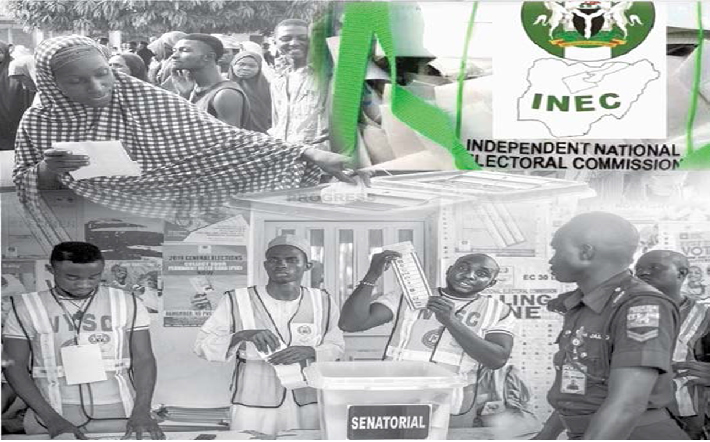
Desirous to enhance the credibility of the 2015 general elections, the then Chairman, Independent National Electoral Commission, Prof. Attahiru Jega, invited academics including vice-chancellors to participate in the various processes – collation and announcement – of election results. This national assignment was in consonance with one of the tripodal duties of the academic namely community service, teaching and research. It was, apriori , anchored also on the general belief, over the years, that in the pristine traditions of academia, the academic is incorruptible and will not lend itself to unethical practices without consequences. Further, the academic in taking on the assignment was expected to exercise sound judgment, without fear or favour on matters as may arise in the course of duty.
The subsequent elections, 2019 and 2023, in conduct, shenanigans and miasma have raised fundamental questions on the propriety of the confidence that had been reposed on our academics. The gamut of alleged complicity of academics, advertently or inadvertently, in the flawed elections is a negation of the reputation of a vast majority of academics who did not participate in them or were not party to the malfeasance. Indeed, it is a negative stamp on the Nigerian university system. The Academic Staff Union of Universities is uncomfortable with the development and has since dissociated itself from election exercises, allowing individual workers to take decisions on it. This decision, though welcome, is unhelpful and not far-reaching to checkmate collateral damage that may be done to the body of academics and indeed of the university system for the misconduct which may be committed by one academic staff member in the circumstance.
The involvement of vice-chancellors in the election process is a complication to the extent of their vulnerability to unwholesome antics of unscrupulous politicians and the consequent erosion of the ethical and moral high ground to discipline erring employees of the university on any matter. In fairness, many academics involved in the election cannot vouch that they are in firm control of the processes leading to the collation and subsequent announcement of winners. But in their capacities, they must then append their signatures to the outcomes. This is a reasonable ground for ASUU to have detached itself from the processes. It is also a reasonable ground to expect academics to step down their participation in it.
It is true that academics in federal universities are poorly paid. Indeed, the aftermath of the last eight-month strike, in unpaid salaries and earned academic allowances, have exacerbated the poor financial status of the academic, dislocating cooperative arrangements and repayment schedules. Yet, the raison d’etre for the strike has not been addressed leaving the universities with challenges. In normal circumstances, it is infra dig for academics to accept the mundane duties of conducting elections on behalf of INEC. Otherwise, where in the world would academics be so mobilised? Furthermore, for reasons of insecurity arising from primitive politicians who deploy thugs, endangering lives, it is reasonable to expect non-participation of academics in the election process. Regrettably, many academics were involved in the 2023 elections, perhaps for reasons of patriotism or for basic necessity. But lest we forget, INEC boss is an academic and a professor. Indeed, we have had professors as head of INEC some of whom performed creditably–Attahiru Jega. The academic left a mark of honour on the sands of time and on the body of academics.
Admittedly, where INEC fails to deliver credible elections, it is for multifarious reasons, not least of which is the integrity of the INEC boss and staff. For the 2023 elections the role of INEC in the failure of the electoral processes is under scrutiny.
The Nigerian university system needs repositioning to restore the pristine order which characterises the ivory tower and to be truly a beacon of society. It is preposterous that ASUU has embarked on many strikes ostensibly to press the government to re-engineer the university system, provide congenial working environment and respectable salaries for academic staff.
Still on integrity, the appointment process of the professor, the highest rank of the academic, is fairly similar across universities in Nigeria, involving internal and external mechanisms to assess scholarly output, focus and international visibility. The rigour of the processes may differ for universities. Circumvention of any of the requirements for elevation of persons to the rank is an abuse of the process and raises a question on its integrity. ASUU has had cause to raise an objection to elevation of a serving minister of the Federal Government to the rank of professor under circumstances that cannot be justified for the purpose. Therefore, the Nigerian university must be mindful of the integrity of its processes.
The need to reposition the university system is an imperative but it must be within the framework of a new Nigeria which recognises the overarching role of the institution as a development instrument equipped to discharge its onerous duties in all ramifications. It demands restoration of enabling working environment and competitive welfare packages for the faculty in ways that dignify them. It demands full autonomy as has been canvassed by ASUU over the years to allow for creativity and innovation in management and, in research for development.
- Prof Ighodalo Eromosele is ex-Deputy Vice-Chancellor (Academic), Federal University of Agriculture, Abeokuta, Ogun State





